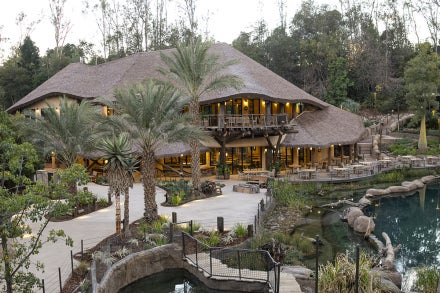FOR IMMEDIATE RELEASE
CONTACT:
San Diego Zoo Wildlife Alliance
Public Relations
619-685-3291
publicrelations@sdzwa.org
sdzwa.org
NEWS RELEASE
Illegally Trafficked Spider Monkeys Receive Expert Care by San Diego Zoo Wildlife Alliance
Three Baby Monkeys Confiscated at the US-Mexico Border Receiving Specialized Treatment for Malnourishment, Lethargy
SAN DIEGO (Jan. 19, 2024) – Three baby spider monkeys confiscated at the United States-Mexico border are now safely with the wildlife care specialists at San Diego Zoo Wildlife Alliance.
U.S. Customs and Border Protection authorities at the Calexico West Port of Entry thwarted the illicit smuggling of the monkeys—two females and one male—in August. A subspecies of Geoffroy’s spider monkey (designated Endangered by the International Union for Conservation of Nature Red List of Threatened Species), the trio was estimated to be approximately two months old at the time of their rescue. They were found malnourished and in poor condition.
The monkeys were seized and placed in quarantine by the U.S. Department of Agriculture Veterinary Services. San Diego Zoo Wildlife Alliance wildlife care specialists answered the emergency call in the middle of the night and immediately responded, taking the monkeys to the Paul Harter Veterinary Medical Center at the San Diego Zoo Safari Park for full examinations and critical care, and they have remained there under close observation the past several months. Despite facing initial challenges, including lethargy and mobility issues, all three monkeys are now flourishing under San Diego Zoo Wildlife Alliance’s expert care. They have been consistently eating well, gaining weight and exhibiting normal behavior and movement. While being treated, the monkeys have had access to the outdoors and opportunities for socialization.
The trio has now been moved from the Veterinary Medical Center to the Animal Care Center at the Safari Park. To increase public awareness and advocacy about the harmful, illegal wildlife trade, a new habitat has been developed where the public will have an opportunity to see these monkeys in the coming weeks. Periodically, other wildlife that has been confiscated as part of the illicit wildlife trade may also be temporarily cared for here while awaiting permanent rehoming. The habitat features educational information about the Southern California Wildlife Confiscation Network (SCWCN).
SCWCN is a coalition of area zoos, aquariums and other animal-care facilities that jump in to provide immediate medical care and housing for wildlife trafficked through U.S. ports of entry. “This story illuminates the critically important role of accredited zoos and aquariums in providing world class care for wildlife and responding in a moment’s notice,” said Lisa Peterson, executive director, San Diego Zoo Safari Park. “In these difficult moments, we see it as our responsibility to be ready and provide the best care possible, assess their individual needs, give them opportunities to experience environments that reflect their native habitats, and when appropriate, the complex social dynamics critical to their well-being.”
“We wish these monkeys were not trafficked in the first place, but to have been found where they were and to have received the care they did is the best possible outcome,” said Hendrik Nollens, vice president of wildlife health, San Diego Zoo Wildlife Alliance. “Too often the outcome for smuggled wildlife is poor.”
Criminal wildlife trafficking is on the rise, and Southern California is considered an epicenter for the illicit trade, which is tied to international crime and drug networks. According to the Wildlife Trafficking Alliance, the U.S. Fish & Wildlife Service seized nearly 50,000 illegally smuggled wildlife between 2015 and 2019. Accredited zoos and aquariums are frequently called to provide critical care assistance for the seized wildlife.
As a founding member SCWCN, San Diego Zoo Wildlife Alliance plays a pivotal role on the front lines of emergency response to wildlife smuggling. Incidents like this one demonstrate San Diego Zoo Wildlife Alliance’s ongoing commitment to addressing the critical issues of wildlife trafficking, exploitation and mistreatment.
###
About San Diego Zoo Wildlife Alliance
San Diego Zoo Wildlife Alliance, a nonprofit conservation leader, inspires passion for nature and collaboration for a healthier world. The Alliance supports innovative conservation science through global partnerships. Through wildlife care, science expertise and collaboration, more than 44 endangered species have been reintroduced to native habitats. Annually, the Alliance reaches over 1 billion people, in person at the San Diego Zoo and San Diego Zoo Safari Park, and virtually in 150 countries through media channels, including San Diego Zoo Wildlife Explorers television programming in children’s hospitals in 13 countries. Wildlife Allies—members, donors and guests—make success possible.
About San Diego Zoo Wildlife Alliance San Diego Zoo Wildlife Alliance is a nonprofit international conservation leader, committed to inspiring a passion for nature and working toward a world where all life thrives. The Alliance empowers people from around the globe to support their mission to conserve wildlife through innovation and partnerships. San Diego Zoo Wildlife Alliance supports cutting-edge conservation and brings the stories of their work back to the San Diego Zoo and San Diego Zoo Safari Park—giving millions of guests, in person and virtually, the opportunity to experience conservation in action. The work of San Diego Zoo Wildlife Alliance extends from San Diego to eco-regional conservation “hubs” across the globe, where their expertise and assets—including the renowned Wildlife Biodiversity Bank—are able to effectively align with hundreds of regional partners to improve outcomes for wildlife in more coordinated efforts. By leveraging these skills in wildlife care and conservation science, and through collaboration with hundreds of partners, San Diego Zoo Wildlife Alliance has reintroduced more than 44 endangered species to native habitats. Each year, San Diego Zoo Wildlife Alliance’s work reaches over 1 billion people in 150 countries via news media, social media, their websites, educational resources and the San Diego Zoo Wildlife Explorers television programming, which is in children’s hospitals in 13 countries. Success is made possible by the support of members, donors and guests to the San Diego Zoo and San Diego Zoo Safari Park, who are Wildlife Allies committed to ensuring all life thrives.



